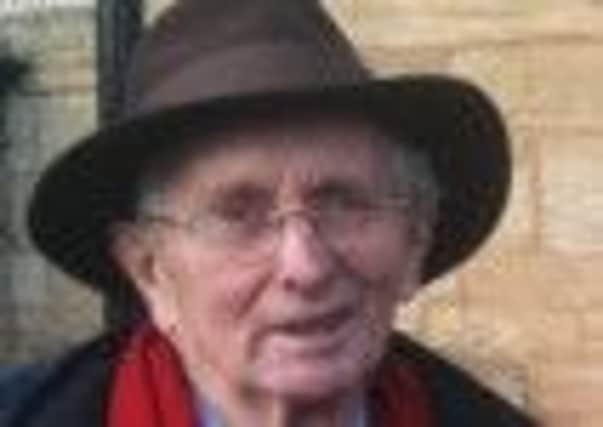Obituary: Professor J Gerald Collee CBE FRCPath FRCPE FRSE, microbiologist


Gerald Collee was a distinguished microbiologist whose focus latterly was a desire to help protect the public from the potentially devastating transmission of BSE to humans.
He chaired a working group to safeguard medicines from infected bovine material and gave evidence to the independent inquiry into Bovine Spongiform Encephalopathy (BSE) following the crisis over the epidemic of “mad cow disease” in the 1990s.
Advertisement
Hide AdAdvertisement
Hide AdHe was made a CBE for services to medicine, and his long career included two decades as a professor of bacteriology at Edinburgh University, where he headed the department of medical microbiology, and many years as consultant bacteriologist to Lothian Health Board and as microbiology consultant adviser to the Scottish Home and Health Department.
He was also a founding member of the Royal College of Pathologists and chairman and editor in chief of the Journal of Medical Microbiology.
The son of a dentist, he was born in Bo’ness and educated at Bo’ness and The Edinburgh Academies before studying medicine at Edinburgh University, graduating in 1951.
His first job was as a house doctor at Roodlands General Hospital in Haddington, followed by national service, where he became a captain in the Royal Army Medical Corps, serving as regimental medical officer to the 5th Royal Northumberland Fusiliers and officer commanding the army medical reception station at Newcastle on Tyne.
He spent the next year as an assistant GP at Shifnal in Shropshire but was lured back to Edinburgh where his mentors had encouraged him to return to enter academia.
Only a decade earlier penicillin had become commercially available and this great era of development in antibiotics was an exciting time for the young microbiologist.
He lectured in bacteriology at Edinburgh University Medical School from 1955, furthering his own studies to graduate MD and win the gold medal in 1962. Awarded a graduate travelling scholarship he went off to study medical statistics and epidemiology at the London School of Hygiene and Tropical Medicine after which he spent a year as the World Health Organisation’s visiting professor of bacteriology in Baroda, India.
Back in Edinburgh in 1964 he became a founding member of the Royal College of Pathologists and was appointed professor at Edinburgh in 1974.
Advertisement
Hide AdAdvertisement
Hide AdFive years later he was appointed to the Robert Irvine chair of bacteriology, later renamed medical microbiology, at the capital’s medical school where, after retiring, he remained emeritus professor.
His areas of special interest included anaerobic bacteria (those which do not need oxygen to live or grow) of clinical importance in relation to tetanus, gas gangrene and other conditions; bacterial toxins; immunisation against infectious diseases – he was a member of various advisory committees on infection, control vaccination and immunisation; and antibiotics and antibacterial agents.
He also worked in the field of food-borne diseases and bacterial food poisoning and produced numerous papers and books on bacteriological and related subjects as well as editing Mackie and McCartney’s textbook Practical Medical Microbiology.
But it was in the late 1980s, as alarm over BSE intensified, that his expertise was in demand as the government grappled to assess and control the disease’s impact. Already a member of the committee on the Safety of Medicines (CSM) in London and chair of the biological sub-committee, he was asked to chair the CSM’s BSE working group.
He would later write three reviews of the BSE situation, one titled A Dreadful Challenge, for The Lancet, and provide evidence to the BSE inquiry, a wide-ranging investigation into numerous issues surrounding the epidemic and its handling, including the development of the human equivalent Creutzfeld Jacob Disease, which reported in 2000.
Professor Collee, who was awarded his CBE in the 1991 New Years Honours list, retired later that year but continued his interest in his field, remaining a member of the Medicines Commission, London and the Medical Research Council’s vaccination and immunisation procedures and medicines committees until 1995.
Already a Fellow of the Royal College of Physicians in Edinburgh, in 1993 he was elected a Fellow of the Royal Society of Edinburgh.
An accomplished writer, in retirement he enjoyed writing poetry and had a number of anthologies of poems and verses published. He also played fiddle with a folk band at a local hotel in Aberfeldy where he had a cottage. But his other great love, in addition to painting and gardening, was dining at the New Club and various Edinburgh restaurants. During his academic career he taught all three of his children, all of whom qualified in medicine at Edinburgh.
Advertisement
Hide AdAdvertisement
Hide AdWhile two pursued careers as doctors – daughter Carol is a GP in Australia and son George is an anaesthetist at the Royal Free Hospital in London – a third, son John, inherited his father’s passion for words and is a writer and screenwriter whose credits include Creation, the story of Darwin’s life, and the Oscar-winning animated film Happy Feet.
Professor Collee, who was divorced from his first wife Isobel and widowed by his second wife Professor Anne Ferguson, is survived by his close companion Doreen Martin, his brother Ian and sister Moira, three children and eight grandchildren.
A service celebrating his life, to which all are welcome, will be held at Mayfield Salisbury Parish Church, Edinburgh at 11am on Wednesday, 25 September.